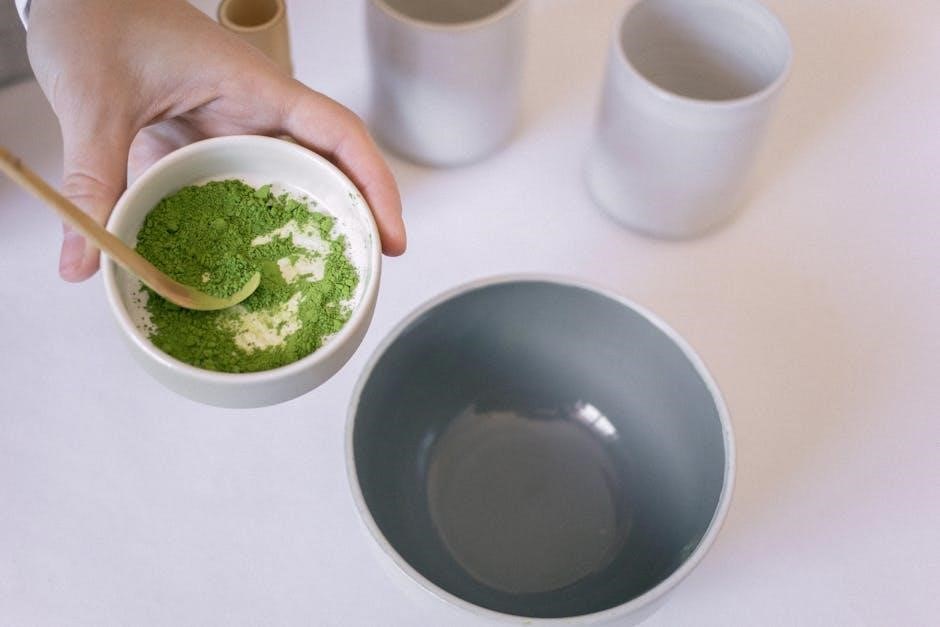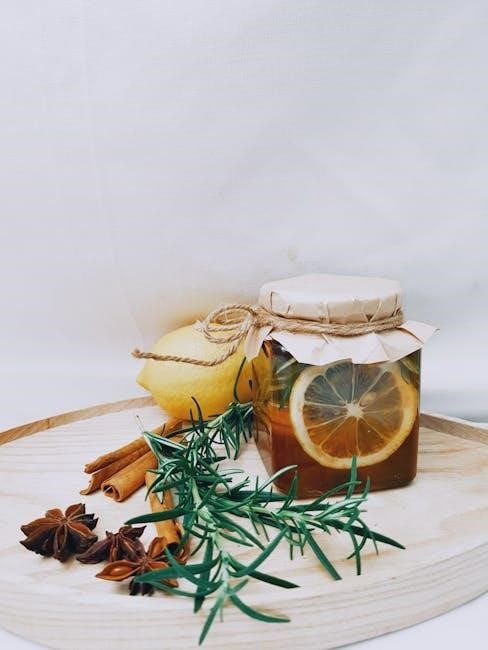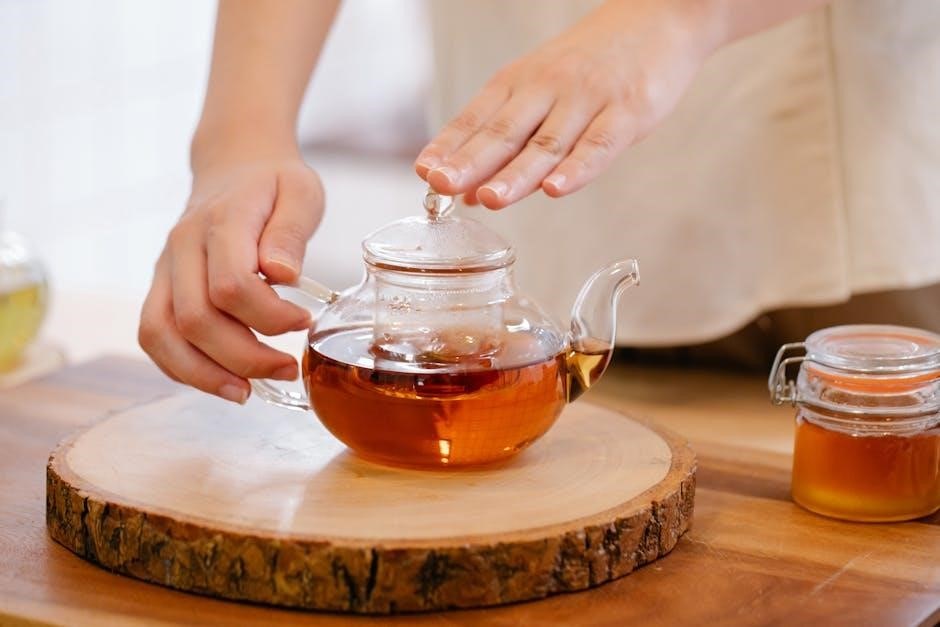Discover the art of creating comforting‚ health-promoting beverages with homemade herbal tea recipes. Explore the simplicity of crafting natural remedies and flavorful blends for wellness and enjoyment.
What Are Herbal Teas?
Herbal teas are caffeine-free beverages made from infusing flowers‚ roots‚ leaves‚ and herbs in hot water. They offer a wide variety of flavors and health benefits‚ from calming stress to boosting immunity. Unlike traditional teas‚ herbal teas are not derived from tea leaves‚ making them a natural‚ customizable option for those seeking wellness and flavor.
Benefits of Making Your Own Herbal Teas
Crafting your own herbal teas allows for customization‚ ensuring freshness and potency. By using high-quality herbs‚ you avoid additives found in commercial products. This method promotes health‚ saves money‚ and offers a creative outlet to tailor blends for specific needs‚ whether for relaxation‚ energy‚ or immune support‚ making it a rewarding and beneficial practice.
Health Benefits of Herbal Teas
Herbal teas promote overall wellness‚ boost immunity‚ and support mental clarity. They offer natural remedies for various health concerns‚ aiding in disease prevention and holistic well-being naturally.
Stress Relief and Relaxation
Herbal teas are a natural way to unwind and reduce stress. Lavender and chamomile teas promote calmness‚ while valerian root helps with anxiety. These blends create a soothing experience‚ aiding in relaxation and improving sleep quality. Regular consumption can lower cortisol levels‚ fostering a peaceful mind and body‚ making them ideal for daily stress relief and mental well-being.
Immune Support and Antioxidants
Herbal teas rich in antioxidants and immune-boosting properties strengthen the body’s defenses. Echinacea and elderflower teas are known to fight infections and reduce inflammation. These blends enhance immune function‚ protect against free radicals‚ and promote overall health. Regular consumption can help prevent illnesses and maintain vitality‚ making them a natural choice for boosting immunity and well-being.
Digestive Health and Anti-Inflammatory Properties
Herbal teas like ginger and peppermint aid digestion‚ reducing indigestion and nausea. Chamomile and calendula soothe inflammation‚ while dandelion root supports liver health. These teas alleviate digestive discomfort‚ reduce inflammation‚ and promote a balanced digestive system‚ offering natural relief for bloating‚ cramps‚ and other gastrointestinal issues.
Skin Health and Anti-Aging
Herbal teas rich in antioxidants‚ such as hibiscus and rosehip‚ protect skin from damage and promote anti-aging. Green tea and chamomile reduce inflammation‚ improving skin clarity and elasticity. These teas help combat wrinkles and age spots‚ supporting radiant‚ youthful skin while offering a natural‚ soothing approach to skincare.
Basic Herbal Tea Preparation Methods
Steeping herbs in hot water is the essence of herbal tea preparation. Use one teaspoon of dried herbs per cup‚ steep for 5-10 minutes‚ then strain and enjoy.
Steeping Times and Temperatures
Optimal steeping times vary by herb: delicate flowers like chamomile steep for 5-7 minutes‚ while robust roots like ginger may need 10-15 minutes. Water temperature should range from 90°F to 212°F‚ depending on the herb. Use boiling water for roots and seeds‚ and lower temperatures for leaves and flowers to preserve their potency and flavor.
Using Dried vs. Fresh Herbs
Dried herbs are more concentrated‚ requiring 1 teaspoon per cup‚ while fresh herbs need triple the amount. Dried herbs offer longer shelf life and convenience‚ while fresh herbs provide vibrant flavors. For preparation‚ dried herbs can be used directly or in tea balls‚ while fresh herbs may need crushing to release oils. Honey can darken the tea slightly.
Tools You’ll Need: Tea Balls‚ Infusers‚ and Strainers
Essential tools for homemade herbal teas include tea balls‚ infusers‚ and strainers. Tea balls hold loose herbs‚ while infusers allow herbs to unfurl for optimal flavor. Strainers ensure a clean cup by catching solids. These tools make brewing convenient and mess-free‚ enhancing the overall herbal tea experience.

Popular Herbs for Homemade Teas
Herbs like peppermint‚ chamomile‚ and lavender are favored for their unique flavors and health benefits. Ginger and lemon balm add warmth and zest to homemade blends‚ enriching your tea experience.
Peppermint: A Refreshing and Digestive Aid
Peppermint is a cooling herb known for its refreshing flavor and digestive benefits. It eases nausea‚ bloating‚ and indigestion. Use fresh or dried leaves in tea infusions. For a soothing brew‚ steep one tablespoon of dried peppermint in boiling water for 5-7 minutes. Combine with lemon balm or ginger for enhanced flavor and health advantages.
Chamomile: The Calming and Sleep-Promoting Herb
Chamomile is renowned for its soothing effects‚ promoting relaxation and improving sleep quality. Its calming properties alleviate stress and anxiety‚ while its anti-inflammatory traits soothe digestive issues. Steep one tablespoon of dried chamomile flowers in boiling water for 5-7 minutes. Combine with lavender for enhanced tranquility or honey for sweetness‚ creating a perfect bedtime tea for restful nights.
Lavender: Soothing and Relaxing Properties
Lavender tea offers a serene escape‚ known for its calming aroma and stress-relieving benefits. It promotes relaxation‚ eases anxiety‚ and enhances sleep. Use one teaspoon of dried lavender buds per cup‚ steeped in boiling water for 5-7 minutes. Pair with chamomile for a soothing blend or add honey for sweetness‚ creating a tranquil tea experience that soothes mind and body effectively.
Ginger: Warming and Anti-Inflammatory Benefits
Ginger tea is a spicy‚ invigorating remedy with potent anti-inflammatory properties. It aids digestion‚ eases nausea‚ and offers relief from cold symptoms. Use one teaspoon of fresh ginger‚ sliced or 1/2 teaspoon dried‚ per cup. Steep in boiling water for 5-10 minutes. Add honey or lemon for flavor‚ creating a soothing‚ warming brew that supports overall wellness and vitality naturally.
Easy Homemade Herbal Tea Recipes
Discover simple‚ nourishing herbal tea recipes that blend fresh or dried herbs for delicious‚ health-promoting beverages. Perfect for beginners‚ these recipes offer natural wellness in every sip.
Stress Relief Tea: A Blend of Lavender and Chamomile
This soothing herbal tea combines lavender and chamomile to promote relaxation and reduce stress. Use two tablespoons of dried lavender flowers and one tablespoon of dried chamomile per cup. Steep in boiling water for 5-7 minutes‚ then strain and enjoy. For a calming effect‚ drink before bed or during stressful moments. Store leftovers in an airtight container for up to 24 hours.
Cold and Flu Tea: Echinacea and Elderflower
This revitalizing tea combines echinacea for immune support and elderflower to ease cold symptoms. Steep one tablespoon of dried echinacea root and two tablespoons of elderflower in boiling water for 10-12 minutes. Strain and drink hot‚ optionally sweetened with honey. This blend helps reduce fever and congestion‚ offering comfort during illness. Store dried herbs in a cool‚ dark place for freshness.
Sleep-Promoting Tea: Valerian Root and Lemon Balm
Combine one tablespoon of dried valerian root and two tablespoons of fresh lemon balm leaves. Steep in boiling water for 8-10 minutes‚ then strain. This calming tea promotes relaxation and improves sleep quality. Valerian root soothes nervous tension‚ while lemon balm enhances mood and reduces stress. Enjoy before bed for a restful night’s sleep‚ sweetened with honey if desired.

Customizing Your Herbal Tea Blends
Blend herbs to suit your taste and health needs‚ combining floral‚ spicy‚ and medicinal notes. Use one tablespoon of dried herbs per cup for balanced flavors and benefits.
Understanding the Structure of Herbal Tea Blends
Herbal tea blends often follow a structured approach‚ combining base herbs‚ complementary flavors‚ and accents. Base herbs provide strength‚ while complementary herbs add depth‚ and accents enhance aroma. This balance ensures a harmonious and enjoyable brew‚ tailored to specific health benefits or taste preferences‚ making each blend unique and purposeful.
Combining Herbs for Specific Health Benefits
Herbs can be combined to target specific health needs‚ such as stress relief‚ immune support‚ or digestion. For example‚ lavender and chamomile create a calming blend‚ while echinacea and elderflower boost immunity. Ginger and peppermint aid digestion‚ and rose petals and hibiscus promote skin health. By pairing herbs strategically‚ you can craft teas tailored to your well-being goals‚ enhancing both flavor and therapeutic effects naturally.
Adding Spices and Sweeteners for Flavor
Elevate your herbal teas by incorporating spices like cinnamon‚ ginger‚ or nutmeg for warmth and depth. Natural sweeteners such as honey or maple syrup enhance sweetness without refined sugars. Citrus slices or floral herbs like rose petals add bright‚ refreshing notes. These additions not only enrich the flavor but also complement the therapeutic properties of your homemade blends‚ creating a delightful sensory experience.

Storing and Serving Your Herbal Teas
Store loose herbs in airtight containers in a cool‚ dark place for freshness. Serve teas hot‚ iced‚ or as milk tea‚ and enhance with honey or herbs for added flavor.
Proper Storage for Freshness and Potency
To maintain the quality of your herbal teas‚ store dried herbs in airtight containers away from light and moisture. Keep them in a cool‚ dark place to preserve potency. Fresh herbs can be stored in the refrigerator for up to a week or frozen for longer periods. Proper storage ensures optimal flavor and health benefits.
Serving Suggestions: Iced Tea‚ Milk Tea‚ and More
Serving Suggestions: Iced Tea‚ Milk Tea‚ and More
Enhance your herbal tea experience with creative serving methods. Try brewing as iced tea for a refreshing twist or mix with milk for a creamy texture. Experiment with spices‚ honey‚ or fruit infusions to elevate the flavor. Serve over ice with fresh herbs or blend into lattes for a modern twist on traditional recipes.
Tips for Making the Perfect Cup
Use the right water temperature and steeping times to preserve flavor and nutrients. Enhance your tea with honey or herbs for a personalized‚ delightful brewing experience.
Using the Right Water Temperature
Using the right water temperature is crucial for optimal flavor and nutrient extraction in herbal teas. Different herbs require specific temperatures: roots and seeds thrive at 200°F to 212°F‚ while delicate leaves and flowers prefer 150°F to 170°F. Boiling water can scorch sensitive herbs‚ leading to bitterness‚ while cooler temperatures may result in a weaker infusion. Adjusting the temperature ensures a balanced and enjoyable brew.
Steeping Times for Optimal Flavor and Benefits
Steeping times vary depending on the herb type. Delicate flowers and leaves typically steep for 5-7 minutes‚ while roots and seeds may require 10-15 minutes. Longer steeping enhances flavor and nutrient release‚ but over-steeping can cause bitterness. Adjust time based on desired strength and herbal properties for the perfect cup every time.
Enhancing Flavor with Honey or Herbs
Add honey to sweeten your tea naturally‚ enhancing its flavor without altering its benefits. For floral notes‚ combine herbs like chamomile with lavender‚ or pair spicy ginger with citrusy lemon balm. Experiment with spices like cinnamon or nutmeg for unique twists‚ ensuring each sip is tailored to your taste preferences for a delightful and personalized experience.
Empower your health and wellness journey by experimenting with homemade herbal teas. Discover the joy of creating custom blends that nourish both body and soul.
Encouragement to Experiment and Enjoy
Embrace the world of herbal teas by experimenting with unique blends and flavors. Discover the joy of crafting personalized teas that cater to your taste preferences and wellness goals. With endless possibilities‚ herbal teas offer a creative outlet and a chance to connect with nature. Enjoy the journey of exploration and the comfort of homemade brews tailored just for you.
